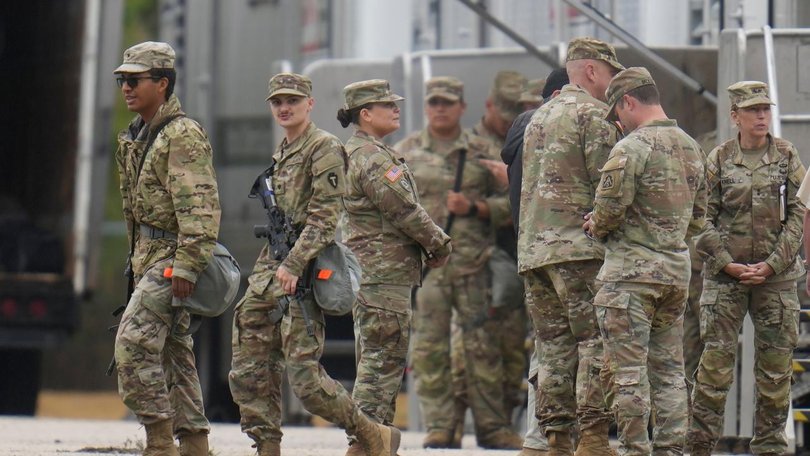Donald Trump’s latest threat escalates showdown with US cities as Texas National Guard enter Illiniois
The Texas National Guard has arrived in the state of Illinois, as President Donald Trump threatens to use a centuries-old law to send troops to more US cities.

Hundreds of Texas National Guard soldiers have gathered at an army facility outside Chicago as Donald Trump’s threat to invoke an anti-insurrection law and deploy troops to more US cities intensifies the battle over the limits to his authority.
The Republican president on Tuesday again left open the possibility that he might use the centuries-old Insurrection Act to sidestep any court rulings blocking the dispatch of Guard troops into Democratic-led cities, over the objections of local and state officials.
A federal judge has temporarily barred Guard troops from heading to Portland, Oregon, though a separate judge has allowed for now a deployment to proceed in Chicago, where federal agents have embarked on a sweeping crackdown on illegal immigration.
Sign up to The Nightly's newsletters.
Get the first look at the digital newspaper, curated daily stories and breaking headlines delivered to your inbox.
By continuing you agree to our Terms and Privacy Policy.“Well, it’s been invoked before,” Trump told reporters in the Oval Office on Tuesday.
He has claimed troops are needed to protect federal property and personnel in carrying out their duties, as well as assisting an overall drive to suppress crime.
“If you look at Chicago, Chicago is a great city where there’s a lot of crime, and if the governor can’t do the job, we’ll do the job. It’s all very simple,” he said.
The law, which gives the president authority to deploy the military to quell unrest in an emergency, has typically been used only in extreme cases, and almost always at the invitation of state governors.
The act was last invoked by President George HW Bush during the Los Angeles riots of 1992.
National Guard and other military troops are generally prohibited from conducting civilian law enforcement, but the Insurrection Act allows for an exception, giving troops the power to directly police and arrest people.
Using the act would represent a significant escalation of Trump’s effort to deploy the military to Democratic cities.
Since his second term as president began in January, he has shown little hesitation in seeking to wield governmental authority against his political opponents as he pushes to expand the powers of the presidency in ways that have tested the limits of the law.
Last week, in a speech to top military commanders, Trump suggested using US cities as “training grounds” for the armed forces, alarming Democrats and civil liberties groups.
Trump has ordered Guard troops to Chicago, the third-largest US city, and Portland, Oregon, following his earlier deployments to Los Angeles and Washington, DC.
In each case, he has defied staunch opposition from Democratic mayors and governors, who say Trump’s claims of lawlessness and violence do not reflect reality.
Texas Guard troops were seen on Tuesday assembling at the Army Reserve Training Center in Elwood, southwest of Chicago.
In Chicago and Portland, protests over Trump’s immigration policies have been largely peaceful and limited in size, according to local officials, far from the “war zone” conditions described by Trump.
Illinois Governor JB Pritzker, a Democrat, accused Trump of intentionally trying to foment violence to justify further militarisation.
“Donald Trump is using our service members as political props and as pawns in his illegal effort to militarise our nation’s cities,” Pritzker said.
Illinois and Chicago sued the Trump administration on Monday, seeking to block orders to federalise 300 Illinois Guard troops and send 400 Texas Guard troops to Chicago.
During a hearing, Justice Department lawyers told a federal judge that Texas Guard troops were already in transit to Illinois.
The judge, April Perry, permitted the deployment to proceed for now but ordered the US government to file a response by Wednesday.
Separately, a federal judge in Oregon on Sunday temporarily blocked the administration from sending any troops to police Portland.
